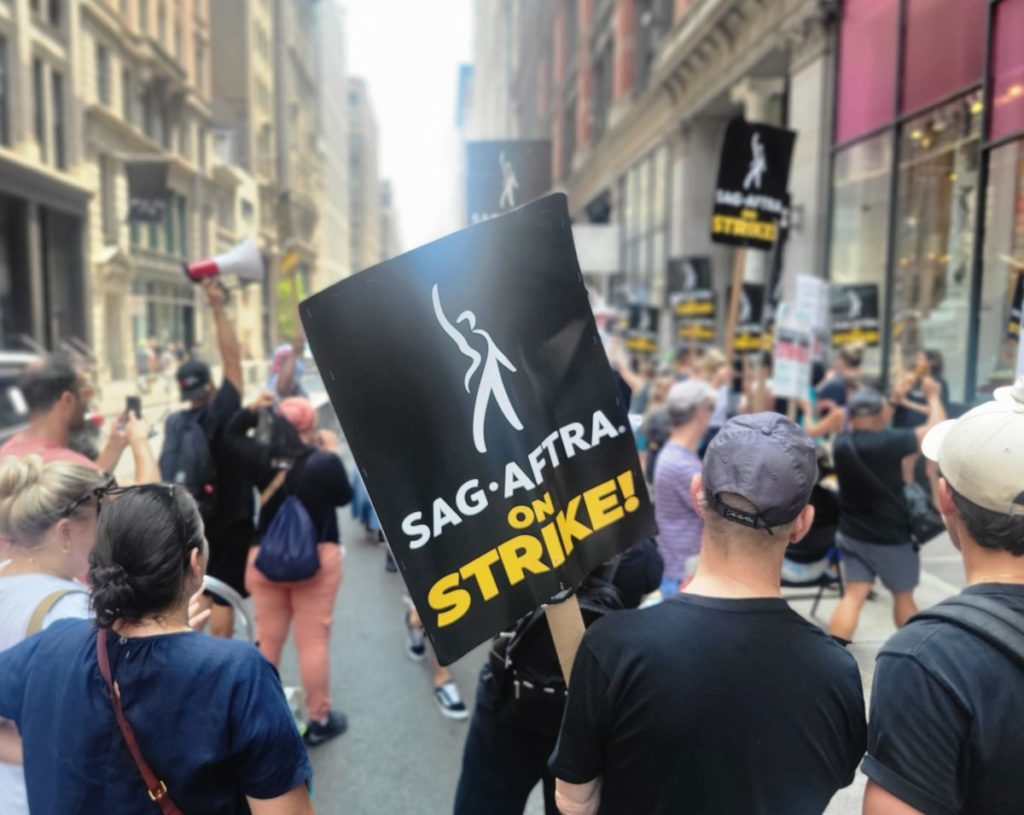They’re mad as hell – and they’re not going to take it anymore.
Yes, this lede directly evokes the very famous line from the 1976 movie “Network” – but not in a tongue-in-cheek way. It’s fitting here because the character who yells it, anchorman Howard Beale, does so in anger at the loss of his job, and the realities of a cruel and crumbling world.
The “they” that I reference above, however, are the unionized members of the entertainment industry – those in the Writers Guild of America and the Screen Actors Guild-American Federation of Television and Radio Artists – who are fighting for their rights to fair minimum pay rates, job and identity protections amid the rapid development of AI technology, and more. (Full disclosure: I’m a member of SAG-AFTRA as a session singer.)
And these efforts are energized. On an oppressively hot Monday afternoon, several days into the combined strike, dozens of union members assembled outside of Netflix’s Manhattan headquarters to create a jovial picket line. Despite the humidity (and residual sweat), writers, actors and singers were marching, chanting, and dancing to songs like Bee-Gees hit “Staying Alive” and Alice Deejay’s club classic “Better Off Alone” – as if to ask studio executives if they’re truly faring better without creative workers. Similar scenes played out throughout other parts of New York City and Los Angeles.
So far, higher-ups have been, shall we say, less than sympathetic to the cause. During a recent, now-viral interview, Disney CEO Bob Iger, who makes a reported $27 million per year, referred to striking employees’ demands and actions as “very disturbing,” adding: “This is the worst time in the world to add … disruption.”
But Hollywood’s workers are fed up, making now the exact right time to act, SAG-AFTRA president Fran Drescher charged in her impassioned announcement about the strike. “I cannot believe … how far apart we are on so many things. It is disgusting. Shame on them,” she said.. “If we don’t stand tall right now, we are all going to be in trouble.”
Her speech was a barn-burner – and a continuation of the tradition of women leading labor movements, perhaps most memorably dramatized in the 1979 movie “Norma Rae.” On the occasion of the latest strike, here are seven women who organized and galvanized workers into collective action over the years.
1. Kate Mullany
Mullany is known as the mother of the country’s first women’s union. The Collar Laundry Union based in Troy, New York, was a 300-strong group founded in 1864 that engaged in a successful week-long strike to both increase wages and improve women’s working conditions. Her efforts grabbed the attention of the National Labor Union, which offered her a job as an assistant secretary – she would ultimately become its vice president. For her achievements on behalf of workers, she was posthumously inducted into the National Women’s Hall of Fame in 2000.
2. Margaret “Maggie” Hinchey
A prominent figure in both the labor and suffrage movements of the early 1900s, Hinchey first entered the workers’ rights fray when her commercial laundry colleagues went on strike. When she joined the movement, her abilities as a public speaker and organizer shone through – making it difficult for her to find industry work post-strike, but easy to get involved with the National American Woman Suffrage Association. Her rhetoric even landed her an audience with then-President Woodrow Wilson – as well as several stints in prison.
3. Rosina Tucker
Tucker played a critical role in the Brotherhood of Sleeping Car Porters, the first-ever labor union organized by Black workers. Because employees themselves feared retribution for joining a union, members’ wives – Tucker chief among them – did the bulk of the recruitment, organizing and fundraising work. In 1925, she was named president of the Women’s Economic Council, and used the position to further her fights for racial and gender equity. Over the years, she would lend her voice to the causes of laundry workers, teachers and red caps in the D.C. area. At her funeral, she was remembered and referred to as “Mother Tucker.”

4. Emma Tenayuca
A civil rights activist as well as a labor organizer, Tenayuca led numerous strikes organized by women workers in the 1930s. Initially, she did this in tandem with the League of United Latin American Citizens and the International Ladies’ Garment Workers’ Union. But Tenayuca, a Mexican woman, felt these organizations failed to honor the needs of Texas’ most marginalized residents. After breaking free, she led her largest demonstration: the pecan shellers strike of 1938 in San Antonio. Over 12,000 workers went on strike for three months, before a compromise was reached. In honor of her years of work, she was named to the San Antonio Women’s Hall of Fame in 1991.
5. Crystal Lee Sutton
Sutton’s unfair working conditions and subsequent activism to fix them served as the inspiration for the aforementioned “Norma Rae” film. While employed at the J.P. Stevens textile factory in North Carolina in the mid-1960s, Sutton attempted to unionize her colleagues in pursuit of better pay and care – she was threatened then fired with a police escort for her trouble. A years-long battle ensued, before a contract agreement between workers and management was reached in 1980. Sutton continued organizing for the larger Amalgamated Clothing and Textile Workers Union afterwards, and received the Pacem in Terris Peace and Freedom Award for her work.
6. Ai-jen Poo
Poo serves as both the president of the National Domestic Workers Alliance, an organization that promotes domestic workers’ rights, and Caring Across Generations, which vies for change in the long-term care industry – the latest in a long line of advocacy roles for her. The Taiwanese-American activist has worked hard to secure paid leave, harassment protections and other basic rights for America’s domestic workers. In 2014, Poo was given a MacArthur “Genius” Award for her dedication to improving workers’ lives.
7. Liz Shuler
The entirety of Shuler’s career is in labor organization – from her first job as an organizer for the International Brotherhood of Electrical Workers, to her current post as the first elected woman president of the American Federation of Labor and Congress of Industrial Organizations, or AFL–CIO – the largest grouping of unions in the U.S. She assumed the role in August 2021, after many years of membership and leadership within the organization, and the untimely death of her predecessor, Richard Trumka. Through her years of work, Shuler has lobbied against policies that would hurt union workers, and for initiatives that ensure safety and fairness.



